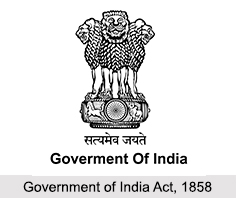 Government of India Act 1858 declared that henceforth India shall be governed by in the name of the Queen and vested in the Queen all the territories and powers of the English Company. However, the Government of India was to be carried on by the Viceroy on behalf of the Queen. The military and naval forces of the Company were transferred to the Crown.
Government of India Act 1858 declared that henceforth India shall be governed by in the name of the Queen and vested in the Queen all the territories and powers of the English Company. However, the Government of India was to be carried on by the Viceroy on behalf of the Queen. The military and naval forces of the Company were transferred to the Crown.
Provisions of Government of India Act 1858
With the establishment of the Act, the Board of Control and the Court of Directors were abolished and all the powers possessed by them were given to the Secretary of the State for India and the Indian Council. The Secretary of State was given the power to superintend, control and give direction for the affair of the Government of India. He was to sit in the Parliament and was to be assisted by a Parliament under Secretary. The Secretary of State was to be a member of the British Cabinet but his salaries and allowances were to be paid out of the revenues of India. The India Council was to consist of 15 members. Seven of them were to be elected by the Court of Directors and the rest of the 8 members were to be appointed by the Crown. More than half the members of the Council were to be those persons who lived in India for 10 years or more and had not left India for more than 10 years at the time of appointment. Each member was to get a remuneration of 12000 pounds annually from the revenues of India.
Rights of the Secretary of State under Act 1858
The Secretary of State for India was to preside over the meetings of the Indian Council. He was given not only a vote but also a casting vote. The Council was to meet twice a week. Its members could be divided into various committees for the purpose of administrative convenience. Ordinarily, the Secretary of State was given the power to overrule even the majority of decisions of the Indian Council. The Secretary of State was given the power of sending and receiving secret messages and dispatches from the Governor-General without the necessity of communicating them to the Indian Council. The Indian Council was a body of permanent civil servants who had expert knowledge about the affairs of India.
Rules and Regulations for India under 1858 Act
The Secretary of State for India was declared to be a corporate body which could sue and be sued in England and India. Rules and regulations made in India by the Secretary of State were to be placed before the House of Commons. The Governor-General and the Governors of the Presidencies were to be appointed by the Crown. The Lieutenant-Governors were to be appointed by the Governor-General subject for the approval to "Her Majesty". The members of the various Councils were to be appointed by the Secretary of State-in-Council.
Division by the Act of 1858
The Act of 1858 had divided the patronage between the Government of India and the Secretary of State-in-Council. Appointments to the covenanted civil service were to be made by open competition in accordance with the rules made by the Secretary of State-in-Council with the help of the Civil Service Commissioners.



















